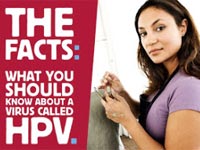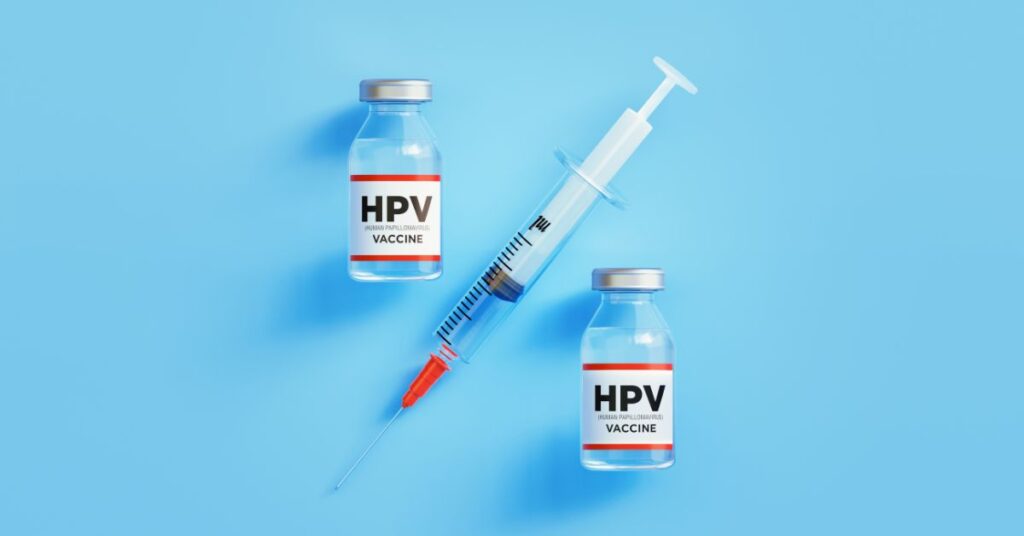 Human Papillomavirus (HPV) is a common virus that is spread through sexual contact. Most of the time HPV has no symptoms so people do not know they have it.
Human Papillomavirus (HPV) is a common virus that is spread through sexual contact. Most of the time HPV has no symptoms so people do not know they have it.
There are approximately 40 types of genital HPV. Somes types can cause cervical cancer in women and can also cause other kinds of cancer in both men and women. Other types can cause genital warts in both males and females. The HPV vaccine works by preventing the most common types of HPV that cause cervical cancer and genital warts. It is given as a 3-dose vaccine.
Find out what you should know:
About the Disease
Vaccine Information
Vaccine Safety
Who Should Not be Vaccinated?
Some Facts
What is HPV?
Human Papillomavirus or HPV is a family of very common viruses responsible for causing almost all cervical cancers.HPV not only causes cervical cancer but various other health problems both in women as well as men like common warts, genital warts and plantar warts. HPV is also the cause of many cancers including those of vulva, vagina, anus, and cancers of the head and neck. Women can infected with types of Human Papillomavirus that cause cervical cancer through sexual intercourse and sexual contact.
What is HPV Vaccine for Cervical Cancer?
As is clear from the name itself, the HPV vaccine or the cervical cancer vaccine protects against the virus which causes about 70% of cervical cancers. Apart from saving many lives, HPV vaccine gives relief from the pain, fear and the costs involved in cervical cancer treatments.
Is There Any Other Way to Protect Against Cervical Cancer?
Yes, there are other ways too for protection against cervical cancer apart from the HPV vaccine. These include:
Regular Pap tests that should begin at the age of 21 or within three years of becoming sexually active. Pap test can detect problems related to HPV infection before cancer develops.
Regular usage of condom also helps in preventing HPV infection.
Absolute and lifelong abstinence is the sure way of protection against HPV as you never get exposed to this virus. Although lifelong abstinence puts you at the minimum possible risk for cervical cancer, in most situations, it is not possible.
Therefore, HPV vaccine is thought to be the best way to protect against cervical cancer.
What is the Right Age for Getting Cervical Cancer Vaccine?
Routine HPV vaccination is recommended for girls at the age of 11 – 12 years. However, the series for HPV vaccination can be started for girls even at the age of 9 years. In fact, the ideal time for getting HPV vaccine is before first sexual contact. However, sexually active women up to age of 26 years can still get HPV vaccine. To conclude, HPV vaccine is recommended for girls and women between 11 to 26 years of age who have not been previously vaccinated. However, HPV vaccination for a woman aged 19 to 26 should be done after a thorough check up and discussion with her healthcare provider regarding her risk of previous HPV exposure and potential benefit from vaccination.
Why HPV Vaccine is Recommended for Young Women Only?
Young women who are not sexually active have not yet been exposed to the types of HPV covered by the cervical cancer vaccine. These young women who have not been exposed or infected with these HPV types get the full benefit of the vaccine.
Who Should Not Get HPV Vaccine?
Women who are acutely ill or those have a history of allergy to yeast should not get HPV vaccine. Women who are pregnant or those who are trying to conceive should also avoid getting HPV vaccine as there may be unknown risks to the unborn baby.
How do Sexually Active Women Benefit from HPV Vaccine?
Although HPV vaccine is recommended for young girls who are not sexually active, other sexually active women may also benefit from the vaccine but the benefits for them is limited. This is because they may already have been exposed or infected with one or more of the HPV types covered by the cervical cancer vaccine.
Is HPV Vaccine Safe?
Many studies have concluded that HPV cervical cancer vaccine is safe because it does not contain any live viruses. There may be side effects of HPV vaccine that include redness and soreness where the shot was given. Headaches and fever can also occur.
Is there HPV Vaccine for Men?
No, there is no HPV vaccine recommended for men though they too get infected with Human Papillomavirus or HPV which causes warts and other sexual transmitted diseases (STD). As of now HPV vaccine has only been approved and recommended for girls and women only.
Is HPV Vaccine Enough to Keep all Worries at Bay?
HPV vaccine for cervical cancer does not protect against other sexually transmitted infections. Therefore, women who have already got HPV vaccine should still be careful about their sexual activity. They should still take regular Pap tests if they have been sexually active.

